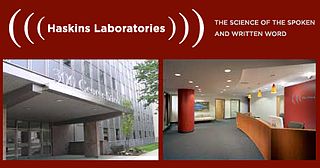Related Research Articles

Dyslexia, previously known as word blindness, is a learning disability that affects either reading or writing. Different people are affected to different degrees. Problems may include difficulties in spelling words, reading quickly, writing words, "sounding out" words in the head, pronouncing words when reading aloud and understanding what one reads. Often these difficulties are first noticed at school. The difficulties are involuntary, and people with this disorder have a normal desire to learn. People with dyslexia have higher rates of attention deficit hyperactivity disorder (ADHD), developmental language disorders, and difficulties with numbers.
Whole language is a philosophy of reading and a discredited educational method originally developed for teaching literacy in English to young children. The method became a major model for education in the United States, Canada, New Zealand, and the UK in the 1980s and 1990s, despite there being no scientific support for the method's effectiveness. It is based on the premise that learning to read English comes naturally to humans, especially young children, in the same way that learning to speak develops naturally.

Phonics is a method for teaching reading and writing to beginners. To use phonics is to teach the relationship between the sounds of the spoken language (phonemes), and the letters (graphemes) or groups of letters or syllables of the written language. Phonics is also known as the alphabetic principle or the alphabetic code. It can be used with any writing system that is alphabetic, such as that of English, Russian, and most other languages. Phonics is also sometimes used as part of the process of teaching Chinese people to read and write Chinese characters, which are not alphabetic, using pinyin, which is.
Reading for special needs has become an area of interest as the understanding of reading has improved. Teaching children with special needs how to read was not historically pursued due to perspectives of a Reading Readiness model. This model assumes that a reader must learn to read in a hierarchical manner such that one skill must be mastered before learning the next skill. This approach often led to teaching sub-skills of reading in a decontextualized manner. This style of teaching made it difficult for children to master these early skills, and as a result, did not advance to more advanced literacy instruction and often continued to receive age-inappropriate instruction.
Phonological awareness is an individual's awareness of the phonological structure, or sound structure, of words. Phonological awareness is an important and reliable predictor of later reading ability and has, therefore, been the focus of much research.
Jonathan Baron is an American psychologist. He is a professor emeritus of psychology at the University of Pennsylvania in the science of decision-making.

Janet Pierrehumbert is Professor of Language Modelling in the Oxford e-Research Centre at the University of Oxford and a senior research fellow of Trinity College, Oxford. She developed an intonational model which includes a grammar of intonation patterns and an explicit algorithm for calculating pitch contours in speech, as well as an account of intonational meaning. It has been widely influential in speech technology, psycholinguistics, and theories of language form and meaning. Pierrehumbert is also affiliated with the New Zealand Institute of Language Brain and Behaviour at the University of Canterbury.

Haskins Laboratories, Inc. is an independent 501(c) non-profit corporation, founded in 1935 and located in New Haven, Connecticut, since 1970. Haskins has formal affiliation agreements with both Yale University and the University of Connecticut; it remains fully independent, administratively and financially, of both Yale and UConn. Haskins is a multidisciplinary and international community of researchers that conducts basic research on spoken and written language. A guiding perspective of their research is to view speech and language as emerging from biological processes, including those of adaptation, response to stimuli, and conspecific interaction. Haskins Laboratories has a long history of technological and theoretical innovation, from creating systems of rules for speech synthesis and development of an early working prototype of a reading machine for the blind to developing the landmark concept of phonemic awareness as the critical preparation for learning to read an alphabetic writing system.

The Female Brain is a book written by the American neuropsychiatrist Louann Brizendine in 2006. The main thesis of the book is that women's behavior is different from that of men due, in large measure, to hormonal differences. Brizendine says that the human female brain is affected by the following hormones: estrogen, progesterone, testosterone, oxytocin, neurotransmitters, and that there are differences in the architecture of the brain that regulate such hormones and neurotransmitters.

Uta Frith is a German-British developmental psychologist and Emeritus Professor in Cognitive Development at the Institute of Cognitive Neuroscience at University College London (UCL). She pioneered much of the current research into autism and dyslexia. Her book Autism: Explaining the Enigma introduced the cognitive neuroscience of autism. She is credited with creating the Sally–Anne test along with fellow scientists Alan Leslie and Simon Baron-Cohen. Among students she has mentored are Tony Attwood, Maggie Snowling, Simon Baron-Cohen and Francesca Happé.
Alvin Meyer Liberman was born in St. Joseph, Missouri. Liberman was an American psychologist. His ideas set the agenda for fifty years of psychological research in speech perception.
Isabelle Yoffe Liberman (1918–1990) was an American psychologist, born in Latvia, who was an expert on reading disabilities, including dyslexia. Isabelle Liberman received her bachelor's degree from Vassar College and her doctorate from Yale University. She was a professor at the University of Connecticut from 1966 through 1987 and a research associate at the Haskins Laboratories.

Reading is the process of taking in the sense or meaning of letters, symbols, etc., especially by sight or touch.
Leonard Katz (1938–2017) was an American experimental psychologist, born in Boston, Massachusetts. He was a professor of psychology at the University of Connecticut (1965–2006) and then professor emeritus until 2017. He was a Fellow of the American Association for the Advancement of Science and the Association for Psychological Science.

Laura-Ann Petitto is a cognitive neuroscientist and a developmental cognitive neuroscientist known for her research and scientific discoveries involving the language capacity of chimpanzees, the biological bases of language in humans, especially early language acquisition, early reading, and bilingualism, bilingual reading, and the bilingual brain. Significant scientific discoveries include the existence of linguistic babbling on the hands of deaf babies and the equivalent neural processing of signed and spoken languages in the human brain. She is recognized for her contributions to the creation of the new scientific discipline, called educational neuroscience. Petitto chaired a new undergraduate department at Dartmouth College, called "Educational Neuroscience and Human Development" (2002-2007), and was a Co-Principal Investigator in the National Science Foundation and Dartmouth's Science of Learning Center, called the "Center for Cognitive and Educational Neuroscience" (2004-2007). At Gallaudet University (2011–present), Petitto led a team in the creation of the first PhD in Educational Neuroscience program in the United States. Petitto is the Co-Principal Investigator as well as Science Director of the National Science Foundation and Gallaudet University’s Science of Learning Center, called the "Visual Language and Visual Learning Center (VL2)". Petitto is also founder and Scientific Director of the Brain and Language Laboratory for Neuroimaging (“BL2”) at Gallaudet University.
Lila Ruth Gleitman was an American professor of psychology and linguistics at the University of Pennsylvania. She was an internationally renowned expert on language acquisition and developmental psycholinguistics, focusing on children's learning of their first language.
David P. Hurford is a psychologist and researcher who specializes in dyslexia/reading difficulties and attention deficit hyperactivity disorder (ADHD). He is a professor and chair of the Department of Psychology and Counseling at Pittsburg State University and directs the Center for Research, Evaluation and Awareness of Dyslexia at the same institution. In addition, he is the president of Reading Screening, LLC and the manager of the Center for the Assessment and Remediation of Reading Difficulties, Inc. a nonprofit created to help individuals become competent readers and was a Spencer Fellow of the National Academy of Education.
Anat Ninio is a professor emeritus of psychology at the Hebrew University of Jerusalem, Israel. She specializes in the interactive context of language acquisition, the communicative functions of speech, pragmatic development, and syntactic development.
Dr Hollis Scarborough is an American psychologist and literacy expert who is a senior scientist at Haskins Laboratories in New Haven, Connecticut. She has been a leading researcher in the area of reading acquisition since 1981, and has been involved with efforts to improve US national policy on the teaching of reading.

Linnea Carlson Ehri is an American educational psychologist and expert on the development of reading. She is a Distinguished Professor Emerita of Educational Psychology at the Graduate Center of the City University of New York. Ehri is known for her theory of orthographic mapping, which describes the process of forming "letter-sound connections to bond the spellings, pronunciations, and meanings of specific words in memory" that underlies fluent reading. As a consequence of orthographic mapping, written words are tightly linked with their pronunciations and meanings in memory and can be recognized by sight.
References
- ↑ The Oxford Handbook of Reading. Oxford University Press. 2015. ISBN 9780199324576 . Retrieved July 27, 2022.
Dr. Treiman's work focuses on the cognitive and linguistic processes involved in reading and spelling, particularly how children learn these skills. She has studied a variety of topics, including children's invented spellings, the characteristics of English and other writing systems, and the special difficulties faced by children with dyslexia and those who are deaf.
- 1 2 3 "Rebecca Treiman CV" (PDF). Retrieved 2020-08-13.
- 1 2 "After the A, B, C's" (PDF). Washington University Magazine. 2004. Retrieved July 27, 2022.
Her senior honors thesis in college was based on research into children's awareness of sound and how that related to reading. (Alvin Liberman, then-president of the well-known Haskins Laboratories in New Haven, Connecticut, was Treiman's adviser.
- ↑ Baron, Jonathan. "Vita" (PDF). University of Pennsylvania. Retrieved July 27, 2022.
Ph.D. Theses supervised...Rebecca Treiman. The phonemic analysis ability of preschool children. 1980.
- ↑ "Institutional Website" . Retrieved 2020-08-13.
- ↑ "Rebecca Treiman's Google Scholar Profile".
- ↑ "Journal of Memory and Language Editorial Board". Elsevier. Elsevier B.V. Retrieved 2015-06-23.
- ↑ "Distinguished Scientific Contributions Award". Society for the Scientific Study of Reading. SSSR. 12 August 2016. Retrieved 2020-08-13.